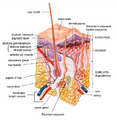Arrector pili muscle facts for kids
Quick facts for kids ' |
|
|---|---|
| Nerve | Sympathetic nerves |
The arrector pili muscles are tiny muscles connected to your hair follicles. These muscles are found in mammals, including humans. When they contract, or squeeze, they make your hairs stand straight up. This is what causes those little bumps on your skin, often called goose bumps.
Contents
What are Arrector Pili Muscles?
Each arrector pili muscle is made of a group of smooth muscle fibers. These muscles attach to several hair follicles at once. They are controlled by a part of your nervous system called the autonomic nervous system, specifically the sympathetic division. This means you don't have to think about them working; they do it automatically! The muscle attaches to the part of the hair follicle where new hair cells are made.
How Arrector Pili Muscles Work
These muscles contract without you even trying. Things like feeling cold or experiencing fear can trigger your sympathetic nervous system. This causes the muscles to squeeze.
Keeping Warm
One of the main jobs of these muscles in most mammals is to help keep them warm. When the hairs stand up, they trap a layer of air close to the skin. This trapped air acts like a blanket, helping the animal hold onto its body heat. Think of it like a puffer jacket for your skin!
Self-Defense
For some animals, like a porcupine, these muscles help with self-defense. When a porcupine's long, thick hairs stand up, the animal looks much bigger and more threatening. This can scare away predators.
Helping Skin Oil
The muscles also help push out a natural oil called sebum. This oil comes from glands near the hair follicles. When the muscle squeezes, it can help force sebum along the hair follicle to the surface of your skin. Sebum helps protect and moisturize your hair and skin.
Holding Hair in Place
Arrector pili muscles also help keep the bottom part of your hair follicle stable and secure in your skin.
When Muscles Don't Work
Sometimes, certain skin conditions can damage these muscles. For example, a disease like leprosy can stop the arrector pili muscles from being able to contract.
History of the Name
The name "arrector pili" comes from the Latin language. It simply means "hair erector," which perfectly describes what these muscles do!
Additional images
-
Insertion of sebaceous glands into hair shaft
-
Cross-section of all skin layers
See also
 In Spanish: Músculo erector del pelo para niños
In Spanish: Músculo erector del pelo para niños



